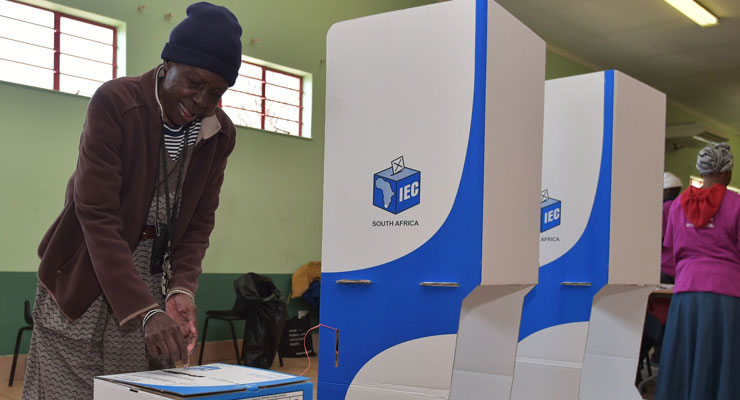
It had been difficult to forecast how transformational South Africa’s presidency would be 25 years after independence. Back in 2007 (and until recently) South Africa stood tall as the undisputed super economy in Africa, at peace with a generally admiring world. The main highlight was government’s modest budget surplus in 2007/08 period. Nobody foresaw the seismic events of the next 12 years. When South Africans go to the polls tomorrow, May 8, the mood will be very different. South African is unhappy, divided and floundering both at home and abroad. Its leadership, self-belief and values are under attack.
For all the shortcomings of the campaign, both Cyril Ramaphosa of the ruling African National Congress (ANC) party and Mmusi Maimane of the main opposition Democratic Alliance (DA) party believe they offer hope of national redemption. Now South Africa has to choose between them, though indirectly. The 27 million eligible voters cast votes to choose a 400 member National Assembly that will in turn vote for a president. Both the ANC and DA are adamant that only “they” can offer a better chance of restoring South Africa’s self-confidence.
However, I acknowledge it is a gamble considering that the ANC is the government of the day and DA control all major cities with the help of the Economic Freedom Fighters (EFF) party led by the outspoken Julius Malema. The voters already have a feel of what to expect from both parties. But given Mr Mmusi Maimane’s inexperience, the lack of clarity about some of his views and skepticism about the prospect of an economic boom that he claims will result from his policies, voting for him is a huge risk worth exploring given the steep road ahead.
Sadly opinion polls put his party way behind the ANC which is expected to plummet below 60% of the votes for the first time in 25 years against DA’s of between 20-25% of the votes.
Thinking ahead to 2019 and 2024
The immediate focus, which has dominated the campaign, looks daunting enough: repairing South Africa’s economy that has slided to third in Africa and its international reputation. Although South Africa officially emerged from recession in 2018, the financial crisis of 2008/09 may be far from finished. Some form of further fiscal stimulus is needed, though estimates of the budget deficit next year already expected to widen to 4.5 percent of gross domestic product in the 2019/20 fiscal year from 4.2 percent in 2018/19, as economic growth remains subdued and tax revenue weak.
In his budget speech to Parliament, Finance Minister Tito Mboweni said revenue in the upcoming 2019/20 financial year would amount to 1.58 trillion Rand (US$114 billion), against spending of 1.83 trillion Rand (US$129 billion). “That means we will spend 243 billion Rand (about US$ 17 billion) more than we earn. Put another way, we are borrowing about 1.2 billion Rand a day, assuming that we don’t borrow money on the weekend,” he said.
Some 82 in 100 South Africans are without medical aid and that excludes those who indicated that they don’t know if they have medical aid, and those classified as ‘unspecified’ showing that many have negligible health-care coverage. Abroad, even though South African troops are in several UN peacekeeping missions, the cack-handed way in which former President Jacob Zuma has dealt with political crisis in Lesotho, Democratic Republic of Congo and Zimbabwe has left South Africa less feared by its enemies and less admired by its friends than it once was.
Yet there are also longer-term challenges, worth stressing if only because they have been so ignored on the campaign. Jump forward to after May 8, 2019 when the current president will relinquish office if not elected by parliament. A combination of demography and the rising costs South Africa’s huge entitlement programmes that include social security, Medical aid provision and university fees subsidies will continue to “bankrupt” the country.
Elsewhere South Africa’s influence abroad is a greater task that is already evident: welding the new emerging economic powers to South Africa. For instance that is not just a matter of handling the rise of Ethiopia, drawing it into global efforts, such as curbs on climate change; it means reselling economic and political freedom to a world that too quickly associates South Africa capitalism with the widening inequality and South Africa justice with Xenophobia attacks on other African nationals. This will take patience, fortitude, salesmanship and strategy.
At the beginning of this election year, there were strong arguments against putting another ANC president at Union Buildings (presidential office).They argue that installing the opposition on May 8 seems an apt punishment for the incompetence, cronyism and xenophobic surrounding the Zuma presidency. Conservative South Africans also needs to recover its damage to the country’s social fabric. Somehow Ramaphosa’s party has ended up not just increasing the size of the government but turning it into a tool of associated with State Capture allegations that are subject of the Zondo Commission of Inquiry. This article will argue that, whoever wins the presidency, they face monumental challenges. There is need for a sober mind at union building that can truly turn things around and restore the battered institutions, most of them either swimming in huge debt or associated with State Capture. Urgent radical reforms to end Xenophobic attacks on foreign African nationals should be a priority. However, that also mean dealing with the unemployment rate that has been consistently measured above 20% of the population.
Ngah Gabriel says
The analysis in this article is very insightful